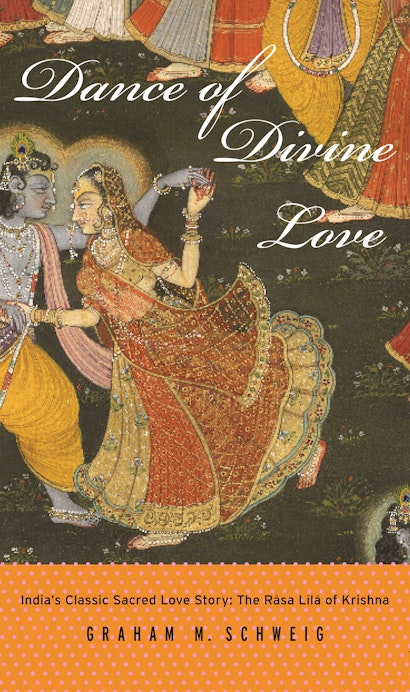The heart of this book is a dramatic love poem, the Rasa Lila, which is the ultimate focal point of one of the most treasured Sanskrit texts of India, the Bhagavata Purana. Judged a literary masterpiece by Indian and Western scholars alike, this work of poetic genius and soaring religious vision is one of the world’s greatest sacred love stories and, as Graham Schweig clearly demonstrates, should be regarded as India’s Song of Songs. The story presents the supreme deity as the youthful and amorous cowherd, Krishna, who joins his beloved maidens in an enchanting and celebratory “dance of divine love.”
Schweig introduces this work of exquisite poetry and profound theology to the Western world in the form of a luminous translation and erudite scholarly treatment. His book explores the historical context and literary genre of the work and elucidates the aesthetic and emotional richness of the composition, highlighting poignant details of this drama of divine love. Schweig illuminates the religious dimensions and ethical nuances of the drama, drawing widely from the commentaries and esoteric vision of masters of the Caitanya school of Vaishnavism, a prominent devotional Hindu tradition.
Themes such as transcendence of death through love, the yoga of devotion, the contrast between worldly love and passionate love for God, and the dialectical tension between ethical boundaries and boundless love are presented. The final event of the Rasa dance, the author concludes, presents a dynamic symbol of supreme love that provides the basis for a theological vision of genuine religious pluralism.
Graham M. Schweig is Associate Professor of Religious Studies and Director of the Indic Studies Program at Christopher Newport University. He earned his doctorate in Comparative Religion from Harvard University and has contributed articles to numerous journals and books in the field.
"This is the most complete presentation of the Rasa Lila, focusing on the text and story itself and looking at it, as it requires, from each of its many viewpoints. The scholarship and teaching quality are first-rate. . . . Schweig's approach is inclusive, consciously reaching out to all levels of reader/devotee/connoisseur and clearly wishing not to leave anyone behind. . . . [E]veryone interested in Hinduism, literature, and religion should consider buying this book."—James D. Redington, S.J., Journal of Vaishnava Studies
"A fascinating study and eloquent translation of the beloved story of the all-attractive god Krishna's nocturnal dalliances with the cowherder women of Vraja as described in the Bhagavata Purana. . . . Schweig render[s] this Sanskrit classic into elegant English."—Joel Bordeaux, Altar Magazine
"This book is an event-for Vaishnavas and everyone else. Long awaited by insiders, it will be a grace to outsiders, too. . . . [E]veryone interested in Hinduism, literature, and religion should consider buying this boo—especially those who incline to mystical love religion and its literature.""—James D. Redington, Jr., Yoga and Vaishnavism
"Scholars of Vaisnavism will be pleased by this volume and its singular focus."—Frederick M. Smith, Religious Studies Review
"This is truly first-rate scholarship. The five-chapter dramatic poem of the Rasa Lila is a gem of world literature, and Schweig has polished it masterfully. His translation gives a sense of the poetic aspect of the work as well as its theology."—E. F. Bryant, Rutgers University
"Schweig's translation is accurate, expressive, and poetic. This book will be useful to classes in a variety of disciplines, including world literature, Eastern religions, and comparative art and culture."—June McDaniel, College of Charleston
"A comprehensive presentation of the Rasa Lila chapters from the Bhagavata Purana has been much awaited, and this volume by Dr. Graham Schweig will surely satisfy scholars and aesthetes alike. Dr. Schweig's knowledgeable mind has danced well with his sensitive heart to produce a great accomplishment."—Acharya Shrivatsa Goswami, Radha Raman Temple, Vrindavana, India and author of Celebrating Krishna

